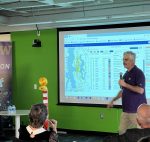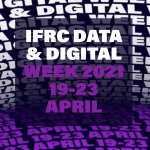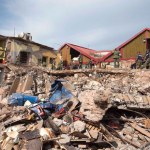News
October 19, 2022
HCDE Professor Mark Haselkorn, HCDE Professor and Chair Julie Kientz, and former Governor Gregoire honor the Virtual Coordination Center project at Mobility Innovation Center’s Ready to Roll event

On October 13, 2022, HCDE Professor and Chair Julie Kientz and former Washington State Governor and Challenge Seattle CEO Christine Gregoire spoke at an event hosted by CoMotion’s Mobility Innovation Center (MIC) to celebrate the Virtual Coordination Center for Multimodal Corridor Management (VCC) project. Led by HCDE Professor Mark Haselkorn and Travis Phelps of the...
January 27, 2022
STEM Ethical Culture: A focus on the behavior of the scientist, but not the science

Senior CoSSaR Researcher, Dr. Robin Mays, and HCDE master’s student, Yifan Lin, have released a new presentation titled “STEM Ethical Culture: A focus on the behavior of the scientist, but not the science” as part of their work on the Ethical STEM project. The University of Washington’s Department of Human Centered Design & Engineering (HCDE),...
April 25, 2021
Workshops Build Education and Interest in Red Cross/Red Crescent on Ethics in Technology

“How might we raise tech to the next level of humanitarian accountability in design and development?” Senior Researcher Dr. Robin Mays led Red Cross Red Crescent (RC/RC) humanitarian practitioners to unpack this question using their experiences working in the field in workshops with support from UW students Yifan Lin and Sabrina Chin. The workshops were...
July 25, 2019
Affiliate Assistant Professor and Senior Researcher Dr. Robin Mays Awarded NSF Grant to Cultivate Ethical STEM

When Dr. Robin Mays began her doctoral program in Human Centered Design & Engineering (HCDE) at the University of Washington, she already had over a decade of practice in the humanitarian sector as a logistician. Now, through a three-year award from the National Science Foundation’s program on Cultivating Cultures for Ethical STEM (Science, Technology, Engineering...
CoSSaR’s latest project video is live!

Learn more about how CoSSaR is facilitating a regional effort with local transportation and law enforcement agencies to address the impact of major incidents in the Seattle Area in this new video produced by UW’s Applied Physics Laboratory.
December 27, 2018
Maritime information sharing

Over the past two years, the CANUS Maritime Information Sharing Pilot Project: Puget Sound (CANUS) evaluated the effectiveness of enhanced radar detection capabilities along the Pacific Northwest international maritime border.
May 14, 2018
CoSSaR’s latest research video is live!

Learn more about CoSSaR's congestion management research--and how law enforcement and transportation agencies are using it along the Seattle I-5 corridor--in this new video produced by UW's Applied Physics Laboratory.
April 10, 2018
CoSSaR Director Mark Haselkorn selected to lead new Seattle interagency mobility partnership

Thanks to the research done by Mark Haselkorn and CoSSaR last year, six regional agencies--Washington State Department of Transportation, Seattle Department of Transportation, Seattle Fire Department, Seattle Police Department, Washington State Patrol, and King County Metro--have formally agreed to work together as the Seattle Area Joint Operations Group (SAJOG).
March 1, 2018
CoSSaR Releases New Report: Beyond Incident Response

The final report includes several recommendations based on the outcomes of the initial research, including enhancement of the cross-agency information sharing environment, as well as improved communication with the commuting public.
September 27, 2017
CoSSaR Researcher Scott Miles to Participate in Mexico Earthquake Reconnaissance

CoSSaR's Dr. Scott Miles will be leading a reconnaissance research team to Mexico from October 1 - 10, 2017. Sponsored by the Earthquake Engineering Research Institute's Learning from Earthquakes Program, Dr. Miles and three other researchers will study the roles, impacts, and experiences associated with Mexico’s earthquake early warning system after the recent earthquakes.
Next page